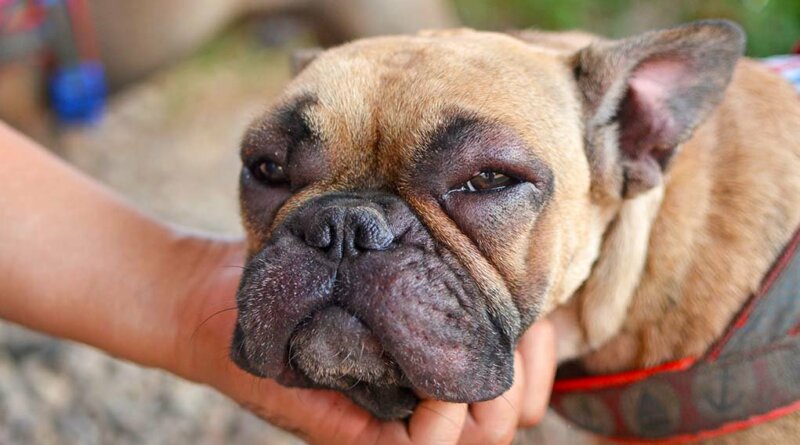5 Reasons Why and What to Do About It
Determining the cause of a dog that has a swollen face is a simple process of elimination. Once you work out why the face is swelling, you’ll know how to tackle it, stop the swelling and help your dog to recover.
When a dog has swollen face, the potential cause could be:
- Allergies
- Abscesses
- Dental Problems
- Tumors
- Other Causes
You should always seek the advise of a professional vet for a complete diagnosis and treatment plan for your pet.
1. Allergies
A severe allergic reaction may lead to swelling of a dog’s throat, making it difficult for them to breathe normally. If your dog’s throat is swelling, their windpipe may be cut off, leading to a change in the color of their gums and potentially your dog passing out.
You likely won’t know that your dog is allergic to something until they have a reaction. Signs your dog may be having an allergic reaction include:
- Difficulty breathing
- Face looks swollen
- Purple or blue gums
- Loss of consciousness
If you see any of these signs, take your dog to the vet immediately. Your vet will ask questions to help them work out the cause. It can be helpful for the vet if you suggest what might have caused the allergic reaction.
The most common causes for an allergic reaction in dogs:
- Food
- Chemicals
- Bee sting
- Spider bite
- Medication
- Vaccine (rare)
If the vet decides that you dog has had an allergic reaction, treatment options may include an antihistamine, antibiotic, or steroids. They may want to take skin or blood tests, and depending on the diagnosis, may recommend a special diet for your dog.
2. Abscesses
When a dog has an abscess, it is likely to be very painful for them. A dog in pain should always be handled with care, as they are more likely to lash out and bite a person in this state, even if the dog is not typically aggressive.
Abscesses in dogs can be caused by an animal bite, or be due to an infected wound. Some tell-tell signs that your dog may have an abscess include:
- A dog’s face is swollen
- A dog’s face or neck appears lop-sided
- The swelling is accompanied by a fever
- A dog refuses to eat or drink
An abscess needs immediate veterinary attention. A vet will be able to treat your dog with anti-inflammatories and antibiotics. In more serious cases, the abscess may need surgical draining.
3. Dental Problems
A common cause of abscesses in dogs are dental problems. If your dog has a fractured or infected tooth, or untreated gum disease, painful abscesses are likely to occur.
When you notice that your dog has lost their appetite, it may be because it is too painful for them to eat, especially food that needs to be bitten and chewed. Along with a dog’s facial swelling, the pain of an abscess may lead to depression, so watch out for changes in your pet’s behavior and mood.
A vet will remove any teeth that are causing a problem in your dog’s mouth, and prescribe antibiotics to clear up the infection. Anti-inflammatory medications may also be offered to help with pain.
Some great preventative methods to help you avoid future dental issues:
- Brush your dog’s teeth regularly
- Offer dental chews and toys
- Feed raw meaty bones
- Prioritize dry dog food over wet food
- During an existing dental issue, switch from kibble to a soft food diet
- Try a fully raw natural diet
4. Tumors
Tumors in dogs can be cancerous or non-cancerous, but it is important to always get your dog checked by a vet to eliminate any risk. If your dog has a tumor in the mouth or the throat, then visible swelling may occur in the face of your pet.
It has also been known for dogs to have tumors that are associated with the eye socket, which can cause the eye to have a bulging effect.
If you notice something strange going on with your dog’s eye or around the face, if they are not eating normally, or you witness any kind of bleeding or unpleasant odor, take your dog to see a vet.
Even if your dog’s tumor turns out to be benign it will need early treatment. Tumors occur from the uncontrolled growth of cells and must be removed via surgery or radiotherapy.
5. Other Causes Of Facial Swelling In Dogs

Craniomandibular Osteopathy. This is a rare condition that can develop in certain dog breeds such as some terriers, Dobermans, Labradors, Great Danes and Boxers. The condition is most common in young dogs aged 3 – 10 months and causes a swelling of the dog’s jaw.
Associated symptoms include drooling, loss of appetite, and fever. There is no cure for craniomandibular osteopathy in dogs, but your vet will be able to offer pain relief until the disease stabilizes, usually when the dog is around a year old.
Cellulitis. This is a bacterial infection of a dog’s skin. It can be cause by puncture wounds or dog bites. Signs include ulcers, redness, tenderness, swelling, and pain. Treatment is usually a mixture of flushing the wound with antiseptic, treating pain with painkillers, and a course of antibiotics to fight off infection.
Summary
When your dog has swollen face, it is a sure sign to get them to a vet, even if only for your own peace of mind. The most you should do yourself in such instances is to carefully clean up and cover any obvious wounds the best you can to prevent them from being infected further and call your local vet for more advice.
When presented with such visible symptoms, it can be easy to attempt a diagnosis yourself, but the most sensible option for the safety and comfort of your pet is to allow a professional to do what they are trained to do. Serious health issues can be nipped in the bud early, and you may find that you have avoided a bigger vet bill, or worse, a tragedy for your pet and your family.
READ NEXT: The Vet’s Guide on Shopping for Hypoallergenic Dog Foods




Regards! Ample material.
cheap essays to buy custom essay order
Many thanks! I like it!
write my book for me write an annotated bibliography for me write for me free
Helpful posts. Kudos.
nj online casino promotions online casino paypal deposit online casino sign up bonus no deposit
Useful posts. With thanks!
hire someone to write a book for me write my research essay top essay writers
Truly all kinds of helpful tips.
writing a personal essay executive resume writing service essay help service
Good information, Kudos!
customer service email writing test the best online resume writing service writing a compare and contrast essay about presentation of ideas
Cheers, Numerous advice!
[url=https://writingpaperforme.com/]writing a research paper[/url] paper writers for college [url=https://custompaperwritersservices.com/]how to write a reaction paper[/url] online essay writer
You’ve made your stand quite nicely..
any good essay writing services resume writing for customer service jobs what is the best dissertation writing service
Cheers, I like it.
paper writer services [url=https://essayservicehelp.com/]essay writing topics in english[/url] essay writing practice
Nicely put, Appreciate it!
essay writing website [url=https://essayservicehelp.com/]cheap essay writing[/url] writing service
Amazing quite a lot of good info!
[url=https://writinganessaycollegeservice.com/]wikipedia writing service[/url] essay write service [url=https://essayservicehelp.com/]paper writing service college[/url] college essay writing tips
You actually explained it well!
[url=https://writinganessaycollegeservice.com/]best essay writing[/url] argumentative essay writing [url=https://essayservicehelp.com/]essay writing site[/url] paper writing services legitimate
Kudos. Terrific information!
best essay writing service reddit writing service essay best custom essay writing services review
Great write ups, Kudos!
cio resume writing service biology essay writing service english article writing service
Really a lot of awesome facts.
best man speech writing service uk undergraduate essay writing service myself essay writing
You’ve made your point pretty clearly.!
history paper writing service student room essay writing service how to improve essay writing
Cheers. I like it!
thesis writing service reviews engineering cv writing service low price essay writing service
Kudos. Terrific information!
essay writing customers services uk coursework writing service best essay writing service uk reddit
Thank you! Awesome stuff!
essay writing service sydney do essay writing services really work research paper writing services
Thanks! Plenty of posts.
reference letter writing service monster india resume writing service will writing service manchester
Cheers! I appreciate this!
argumentative essay writing age uk will writing service 6th grade essay writing worksheets
You actually mentioned that very well.
writing a funeral service benefits of essay writing services engineering cv writing service
Cheers, Loads of advice.
college paper writing service reviews student essay writing services essay writing service co uk review
Incredible a good deal of good info!
writing essays online how to start a writing service essay writing
You reported that fantastically.
high quality custom essay writing service monthly blog writing service application essay writing service
This is nicely expressed. !
essay writing service uae powerpoint writing service a level essay writing service
Superb stuff, Appreciate it.
report writing service are there any good essay writing services technical paper writing service
Приобретайте оборудование надёжности по доступной цене
стабилизаторы напряжения http://stabrov.ru.
cout du levitra 20mg Bang B, Gniadecki R, Larsen JK, Baadsgaard O, Skov L